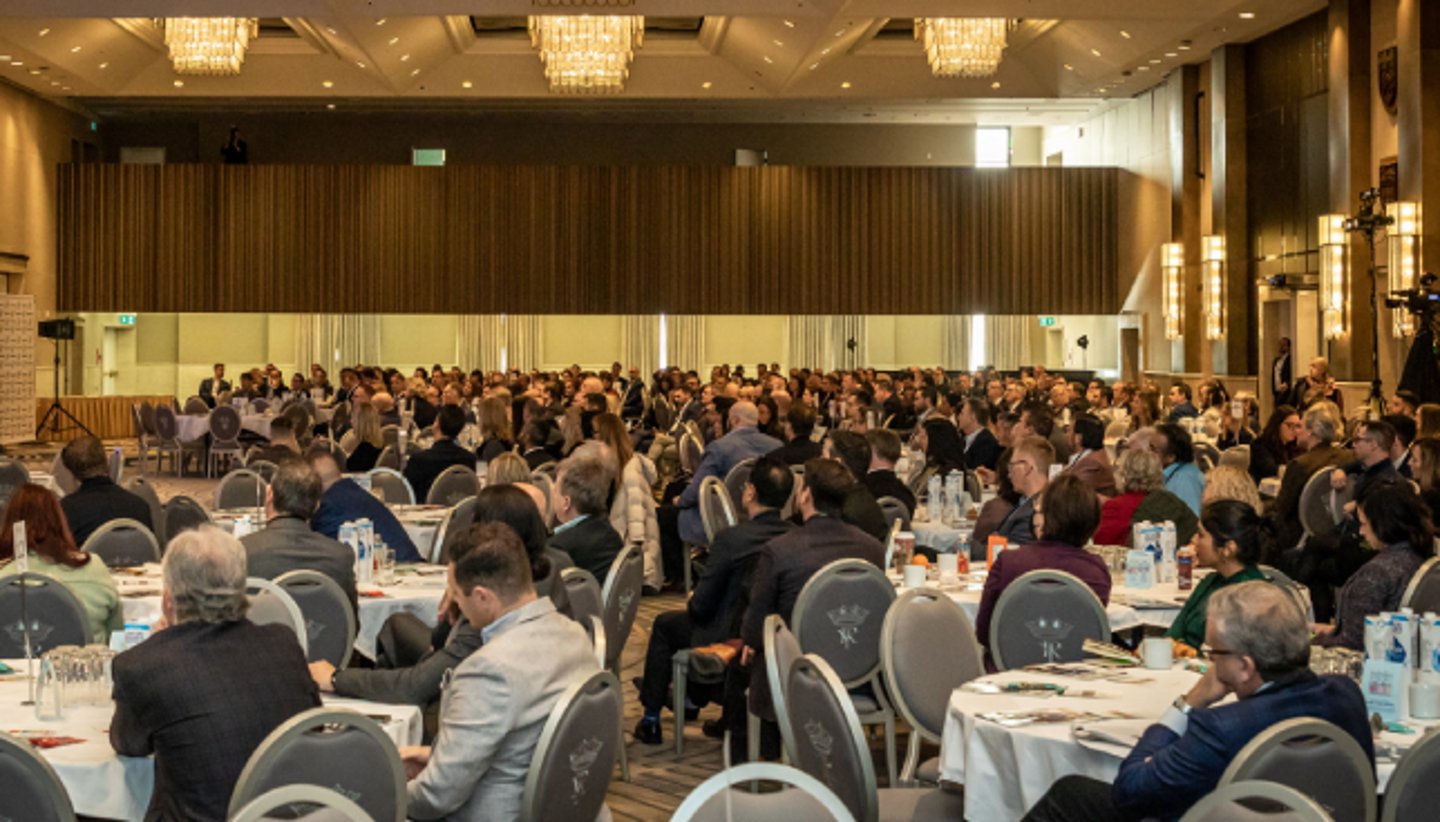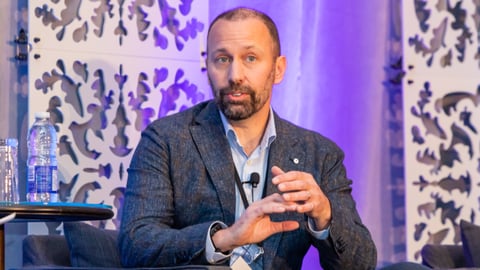Retail leaders talk tech, talent and the future at GroceryConnex
Grocery retail leaders convened in-person at Canadian Grocer’s GroceryConnex on Nov. 21 to talk about the challenges and opportunities in the industry.
Held at the Fairmont Royal York in Toronto, this year’s edition of the annual conference was focused on the future – where the industry is heading, what’s driving it and where change needs to happen.
This year’s Retail Leadership Panel was moderated by Canadian Grocer editor-in-chief Shellee Fitzgerald and featured Darrell Jones, president, Pattison Food Group; Eric La Flèche, CEO, Metro; and Anthony Longo, CEO, Longo’s.
Canadian Grocer compiled the highlights from the session below, in which executives shared insights on COVID-19, tech, talent and more.
Lessons learned
After several years of disruption, grocery leaders said their businesses have become more resilient.
“COVID was the most interesting time in my 46 years in the grocery business. That was a great opportunity to learn a great deal,” Pattison Food Group’s Jones said. “The biggest operational learning we had was how important and how quickly e-commerce… became important to our customers.”
La Flèche said Ontario- and Quebec-based Metro came out stronger on the other side of the pandemic, but challenges remain.
“There are some side effects and casualties. We have more vacant positions than we've ever had, so we can't say we're stronger HR-wise. We need more people and that's a big challenge.”
For Longo, the past three years have seen a breaking down of silos across Longo’s and the industry.
“It forced us all to work together and come up with the right solutions to protect our customers, protect our team members,” he said.
The new consumer
As any retailer knows, consumers can be fickle, especially at times of uncertainty.
Longo said as restrictions are lifted and businesses adopt hybrid work models, categories that were in decline pre-pandemic are now accelerating.
“People realized it's pretty easy to pour cereal on milk and you got breakfast,” he said. “There's a bunch of other categories like that.”
One potentially lucrative category for the Southern Ontario grocer is meal planning, he said.
“We have an opportunity to continue to build on our meal solutions,” Longo told attendees. “We're facing a recession and people are going to be a little more tight with their dollars.”
As the cost of food rises, consumers are finding ways to stretch their grocery budget. La Flèche said Metro has been seeing a shift to discount for several quarters, and he expects that trend to continue.
“We're watching that closely and determining how we can seize that opportunity even more,” he said. “The online shift went crazy during the first part of COVID. It's abated since, but it's still there and it will grow. So we're watching closely the speed of that adoption and how that evolves.”
Jones called these changing consumer habits the “800-pound elephant in the room,” but said retaining customers is all about providing value.
“If you can give the value – value meaning great prices, but also exceptional service…then you stand a good chance of doing well no matter what the economic times are,” he said.
Tackling tech
While many customers are returning to in-store shopping, the e-commerce outlook remains rosy – as long as retailers can balance business needs and consumer expectations.
“The pleasant surprise has been that customer expectations for grocery e-commerce, because it's an asset business, have not been as high as certain other categories,” La Flèche said.
The chief executive said Metro is staying ahead of consumer demand and being prudent.
“It's a test, learn, adapt, and deploy type of environment,” La Flèche said.
At Longo’s, the move to e-comm started back in 1997 with Grocery Gateway.
“There was a significant uplifting in e-commerce, like everyone saw,” Longo said. “And it has tapered off a bit, but it's still substantially higher than it was pre-COVID. So from that point of view, we've had very good stickiness with our customers.”
For Jones and British Columbia-headquartered Pattison Food Group, the shift to e-comm has meant deploying new technology, including an automated system that will service about 10 grocery stores across greater Vancouver with the potential to expand.
“The attempt here is to make our grocery delivery much quicker and lower our cost on delivery through the system,” he said.
Pattison Food Group isn’t the only grocer dipping its toes into the complex world of AI.
“Our way at Metro is to start small and get bigger as we go,” La Flèche said. “We have a few AI projects, pilot projects, to improve customer experience and to improve efficiency… So, we have started on that journey, but we haven't spent as much as e-comm.”
Longo echoed La Flèche, adding that Longo’s is precise about what tech it chooses to test.
“For us, it's more about investing in the right digital properties that are going to help us with the customer experience or something on the efficiency side,” he said. “We're not big enough to be investing large sums of money just to test and learn it.”
The talent challenge
Canada’s labour crunch is having an impact on the grocery industry, particularly on the frontline.
“Our turnover has ticked up a little bit,” Longo said. “I think the best way to stay staffed is take care of the staff you have and ensure that they're well looked after and appreciated and they get opportunities to grow and learn in the business.”
La Flèche agreed.
“[Finding] store people is the biggest challenge,” he said. “Especially in Quebec where the labour challenge is a very serious thing. We need more immigration, we need a more active workforce. Like Anthony said, we try to retain our people as much as we can, provide flexible hours to keep people active longer. So we do a lot to keep our people and it's a big priority.
Like Longo and La Flèche, Pattison Food Group’s focus is on making the company a great place to work, but Jones notes that labour has always been a challenge for grocers.
A bright future
To finish off the discussion, the executives highlighted the areas of the grocery business they believe have the most potential.
“We see good opportunities in Ontario and Quebec and pharmacies,” La Flèche said, adding, “I think [there’s] opportunity for the industry on the environment and on collaborating as an industry on the code of conduct.”
He said Metro sees big opportunity with the upcoming launch of its revamped loyalty program in Quebec, MOI.
“There are lots of opportunities. We have to pick the right ones and invest and put the people behind the right ones,” La Flèche concluded.
Longo’s outlook for the industry was also bright. “There's a lot more opportunities than there are challenges,” he said.
At Pattison Food Group, Jones said he’s focused on opportunities to support the grocer’s customers.
“We've got to focus on a number of fronts that go just beyond our business,” he said. “What [are the] things that are going to help our customers, whatever province they're in, to get through what we suspect is going to be a tough time… We're going to have to play a bigger part in the communities to help and support our customers”



